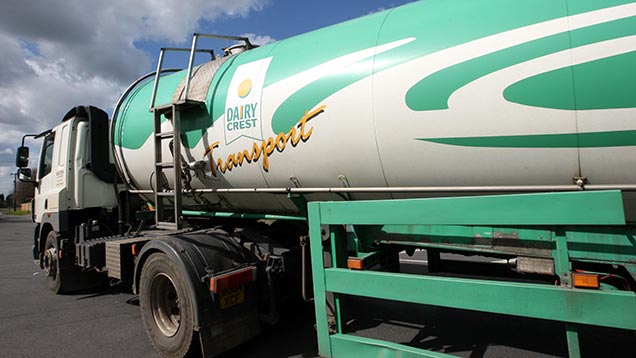Dairy Crest formula slides again for March
 © Rex
© Rex Dairy Crest’s formula milk price has slid downwards again, as markets had a subdued start to 2015.
Farmers with milk priced by the cost-and-commodity tracker will receive 28.641p/litre in March, 0.384p/litre less than the month before.
Bulk cream values slipped below £1,000/t in January and the average retail price for four pints of milk dropped by a penny, after Asda slashed the price to 89p.
Inputs were more mixed, as fertiliser and concentrate values continued to creep upwards while plunging oil prices took red diesel to six-year lows.
See also: Muller Wiseman issues painful March milk price cut
Michael Masters, secretary of suppliers’ group Dairy Crest Direct, said the formula options would carry an advantage of more than 5p/litre above the company’s liquid contract.
Last week Dairy Crest cut both its headline milk prices by 1.5p/litre for March, but promised they would not fall further until July.
“If cream values can retain recent EU market gains at over £1,000/t, and if feed prices continue to be sustained at the current level, this will help support the formula April price,” Mr Masters said.
Dairy Crest announced in early January that it would take 1.6p/litre off the formula in January 2016, after it opened a wide gap with the discretionary rates.
More than 200 Dairy Crest suppliers have some milk priced by the tracker.
The formula contract is based on market returns for January, but dairy commodities have looked more positive in the last fortnight.
Average prices on the Global Dairy Trade auctioned surged 9.4% at the last sale, with whole milk powder values enjoying a stunning 19.2% rise.
A report from trader INTL FCStone said this helped sentiment in European trade stay bullish, with butter and powders well supported.
It said the lower volumes sold on the GDT auction and dry conditions in New Zealand were the main drivers from Oceania.
“This in conjunction with current lower domestic European production on the back of a combination of lower milk prices and the superlevy situation for many of the major European producers has seen the market continue to react to the upside,” the report said.
UK milk production continues to slow down, as supplies in the two weeks to 31 January were just 0.6% higher than the same week in 2014.
French production is also not showing the usual seasonal rise, with collected volumes down 4.3% on the year.
